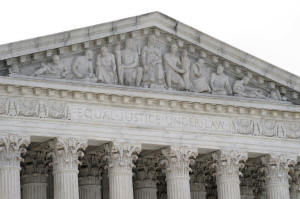Federal agency powers in the crosshairs at the US Supreme Court
 Send a link to a friend
Send a link to a friend
 [July 05, 2023]
By Andrew Chung and John Kruzel [July 05, 2023]
By Andrew Chung and John Kruzel
WASHINGTON (Reuters) - Even as it has ushered in sweeping changes to
American law and society - on abortion, gun rights and affirmative
action - the U.S. Supreme Court has kept tabs on another issue of keen
interest to its conservative majority: keeping federal regulatory power
in check.
The issue will figure prominently during the court's next term, which
begins in October, as the justices already have agreed to decide several
cases that could curtail the authority of U.S. agencies to issue
regulations and enforce laws in areas ranging from finance to fisheries.
The cases involve what has come to be known as the "administrative
state," the agency bureaucracy that interprets laws, crafts federal
rules and implements executive action. The court's conservatives, with a
6-3 majority, in recent years have reined in what they viewed as
governmental overreach by the Environmental Protection Agency (EPA) and
other agencies.
"Next term is going to be a huge one at the court for cases involving
the administrative state," said Brianne Gorod, chief counsel at the
Constitutional Accountability Center liberal legal group. "These cases
all represent challenges that are part of a long-running, multifaceted
conservative attack on the administrative state, and nothing less than
the ability of the federal government to function effectively is at
stake."

The court, in a summer recess after ending its last term on Friday, has
agreed to hear in its coming term cases challenging the
constitutionality of the funding structure for the Consumer Financial
Protection Bureau (CFPB) and the in-house enforcement regime at the
Securities and Exchange Commission (SEC). It also could overturn a
decades-old precedent that helps federal agencies defend their
regulatory actions in court.
Legal experts see potential trouble ahead for the agencies.
"It's harder for the court to rule that the agency's composition or
funding mechanism is unconstitutional without declaring a lot of what
the agency has done to be illegal," said Jonathan Adler, a professor at
Case Western Reserve University School of Law in Cleveland.

The court's conservatives have proven willing to make vast changes to
the law. Last year, they ended the recognition of a woman's
constitutional right to abortion and expanded gun rights. Last week,
they rejected affirmative action policies used by many universities to
boost Black and Hispanic student enrollment and allowed certain
businesses to refuse services for same-sex weddings.
They also last week blocked President Joe Biden's student debt relief
plan and in May embraced a stringent new test for declaring wetlands
protected under a landmark anti-pollution law - rulings that limited the
role of the U.S. government's executive branch and curtailed its
regulatory power.
[to top of second column]
|

A view shows the pediment of the U.S.
Supreme Court building as rulings are expected to be released today
in Washington, D.C., U.S. June 25, 2021. REUTERS/Ken Cedeno

PAYDAY LOANS
In the upcoming CFPB case, the justices will hear the agency's
appeal of a lower court's ruling that its funding mechanism violated
a constitutional provision giving Congress the power of the purse.
The case involves a lawsuit by trade groups representing the payday
loan industry against the agency that enforces consumer financial
laws.
In the latest legal attack on the SEC, the financial markets
regulator, the justices will hear a Biden administration appeal of a
lower court's decision striking down the agency's enforcement
proceedings as a violation of the constitutional right to a jury
trial. The case involves a hedge fund manager who the SEC found
committed securities fraud.
The court will also weigh a challenge by New Jersey-based fishing
companies to a federal regulation requiring commercial fishermen to
help fund a program monitoring herring catches off New England's
coast. The companies asked the court to overturn its own precedent
that calls for judges to defer to federal agency interpretation of
U.S. laws, a doctrine called "Chevron deference."
For the conservative justices, cases such as these often raise a
central concern: the constitutional principle of separation of
powers among the U.S. government's executive, legislative and
judicial branches.
"This is a court that is very interested and comfortable with
separation-of-powers cases and is very interested in opining on it,"
said attorney Sarah Harris, an administrative law expert who has
argued cases before the justices.
The court's embrace of the "major questions" doctrine has provided a
seismic shift in its approach toward agency power. This judicial
approach gives judges broad discretion to invalidate executive
branch actions of "vast economic and political significance" unless
Congress clearly authorized them.
The court's conservatives this year invoked the doctrine to
invalidate Biden's student debt relief and last year to curb EPA
authority to reduce carbon emissions from power plants. In a dissent
in the student loans ruling, liberal Justice Elena Kagan called the
doctrine "made-up."
University of Texas law professor Thomas McGarity, a critic of the
doctrine, said the court's approach is diminishing "the agencies to
which Congress has assigned the responsibility for protecting
people, for protecting the environment and for protecting
consumers."
(Reporting by Andrew Chung in New York and John Kruzel in
Washington; Editing by Will Dunham)
[© 2023 Thomson Reuters. All rights
reserved.]This material may not be published,
broadcast, rewritten or redistributed.
Thompson Reuters is solely responsible for this content.
 |